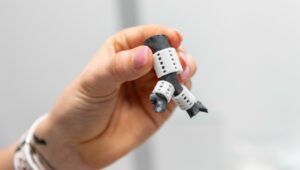You’re a university-based researcher, investigator, faculty member or perhaps even a student who has snagged your first funding for the earliest stage commercialization, design and development activities for your potential medical technology. You might even have completed the first activities with that funding and scored $100,000 or more in follow-on funding from GRA, SBIR, or a combination of both.
Congratulations! You’re on your way!
Now, what’s next and where do you turn for the expertise needed to push your technology down a capital efficient path from concept to commercialization?
 If you haven’t already, it’s time to meet and engage with GCMI.
If you haven’t already, it’s time to meet and engage with GCMI.
GCMI is a Georgia Tech affiliate and the nation’s proving ground for new medical technologies. We follow a phase-gated process that de-risks new medical technologies in a capital efficient way. Our pathway experience and expertise accelerates the speed at which new medical technologies achieve key milestones and regulatory approval.
Engaging us early is key to identifying the right people for the right task at the right time. For example, does your regulatory consultant have experience with the device type, technology and pathway?
As we discussed recently, at the earliest stage, Phase Zero asks and answers the following questions: to better understand a technology’s potential and development pathway.
- Is there a market for the product? Will someone pay for it?
- How will your device or technology improve outcomes compared to the current standard of care?
- What is the product’s FDA approval pathway?
- Can you protect your technology with Intellectual Property (IP)? Who are your competitors?
- What are the critical design elements, specifications, and user needs that make your device work?
Additional activities executed on your behalf in the early stages of design, development and commercialization could include prototyping, cost of goods assessment. These activities depend on the status of the technology. Perhaps you already have a prototype. What does it need for manufacturing at some scale? What are the costs for the materials required? Do the materials need to be sterilized, and if so, what does that mean for its design and design inputs?
 “GCMI is literally a ten minute walk from our innovation studio at Georgia Tech. They also have proficiency in delivering products to markets including working with frontline hospitals and health systems where [products] will be put to use protecting the professionals treating patients.” – Christopher Saldana, Ph.D., Georgia Tech
“GCMI is literally a ten minute walk from our innovation studio at Georgia Tech. They also have proficiency in delivering products to markets including working with frontline hospitals and health systems where [products] will be put to use protecting the professionals treating patients.” – Christopher Saldana, Ph.D., Georgia Tech
GCMI does typically contract for regulatory and IP examination, but we interpret and identify consensus standards in the pathway that guide continuing commercialization, design and development activities. We may contract for component development or prototyping as well, but most of the time at the early stages we have onsite what’s required to make the bulk of requisite parts and prototypes.
Our Phase Zero engagement typically last three to nine months. At the end of those three to nine months you can expect to have the following: a comprehensive report that will touch on all of the buckets: reimbursement, market, IP, regulatory and other concerns that describe the landscape moving forward. It’s a reasonably priced assessment to keep from spending $200,000 or more patenting a device that doesn’t meet a clinical need, a device that won’t get reimbursed, or one with a regulatory pathway so steep it won’t warrant the investment.
It’s possible to spend six figures on a patent then pivot, but innovators should never spend money on preclinical testing without understanding the landscape. Is the market really as big as you thought? If not, those funds spent on preclinical work were likely wasted.
The aforementioned report is fashioned in a way to plug into SBIR applications or others for further funding seamlessly. Depending on the technology’s status when it comes to us, you may complete with us what’s needed to create a prototype and design history files ready for manufacturing at some scale in stages beyond Phase Zero.
Why GCMI?
Our experience in the medical device industry is second to none. We have worked for scores of startups with exits, Fortune 500 companies and everything in between in multiple therapeutic areas including cardio, gastro, ortho and others. We’re not a design and development group that focuses on one specific device or therapeutic area. We don’t waste time and money with endless prototypes when those efforts and funds should be spent elsewhere. We’re experts in the process and use applying that knowledge to almost any type of new medical device or technology.
As a Georgia Tech affiliate our primary concern is your success.
 We have served as the manufacturer of record for Dr. Scott Hollister’s groundbreaking tracheal implant. We understand what it takes to advance new technologies and devices to first-in-human opportunities. Dr. Emily Blum, a pediatric urologist, is our Clinical Liaison who serves as the bridge between physician and engineer with a deep understanding of the clinical environment. And we count Mark Prausnitz, Omer Inan, Pablo Robles and other GT faculty among the innovators we have helped achieve full market and commercialization status for their technologies.
We have served as the manufacturer of record for Dr. Scott Hollister’s groundbreaking tracheal implant. We understand what it takes to advance new technologies and devices to first-in-human opportunities. Dr. Emily Blum, a pediatric urologist, is our Clinical Liaison who serves as the bridge between physician and engineer with a deep understanding of the clinical environment. And we count Mark Prausnitz, Omer Inan, Pablo Robles and other GT faculty among the innovators we have helped achieve full market and commercialization status for their technologies.
At the end of the day, it’s never too early to get in touch with us to discuss what you believe may be a promising medical application for your university-generated technology. Contact us via the form below.
